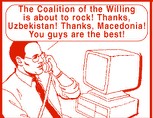This war is different, says Tommy Franks. Yes, but not in the way he thinks
Fine piece in the Guardian by Brian Whitaker, which says, in part:
“Most wars start by accident or with a flourish of misplaced jingoism. But this war is unique. It is hard to recall any conflict in history that aroused so much opposition even before it began. At best its legitimacy and purpose is in serious doubt. At worst, millions regard it as illegal and/or immoral.
Besides that, it is led by a president for whom few outside the United States have any respect. Just as the onus was placed on Iraq, during the period of inspections, to prove that it had no weapons of mass destruction, the onus now is on the invasion forces to convince a sceptical world of their bona fides. This is probably impossible to do, since the official and unofficial aims of the war cannot be reconciled.
One example of confused messages came on the first day with the attempt to assassinate Saddam Hussein. Apart from looking hasty and opportunistic, it conflicted with argument made during the UN inspection process that the main goal was to disarm Iraq. …”.
It’s different in other ways too. For example, US and British politicians are baffled by the fact that the ‘unity effect’ is less powerful than hitherto. Up to now, when troops were finally committed, the polulation tended to rally behind them. But that isn’t happening to anything like the same extent just now. Why? In an interesting article (also in today Guardian, Peter Preston argues that it’s partly because it’s been sold as a high-tech, low-collateral-damage war waged by machines. And people won’t rally behind machines.

